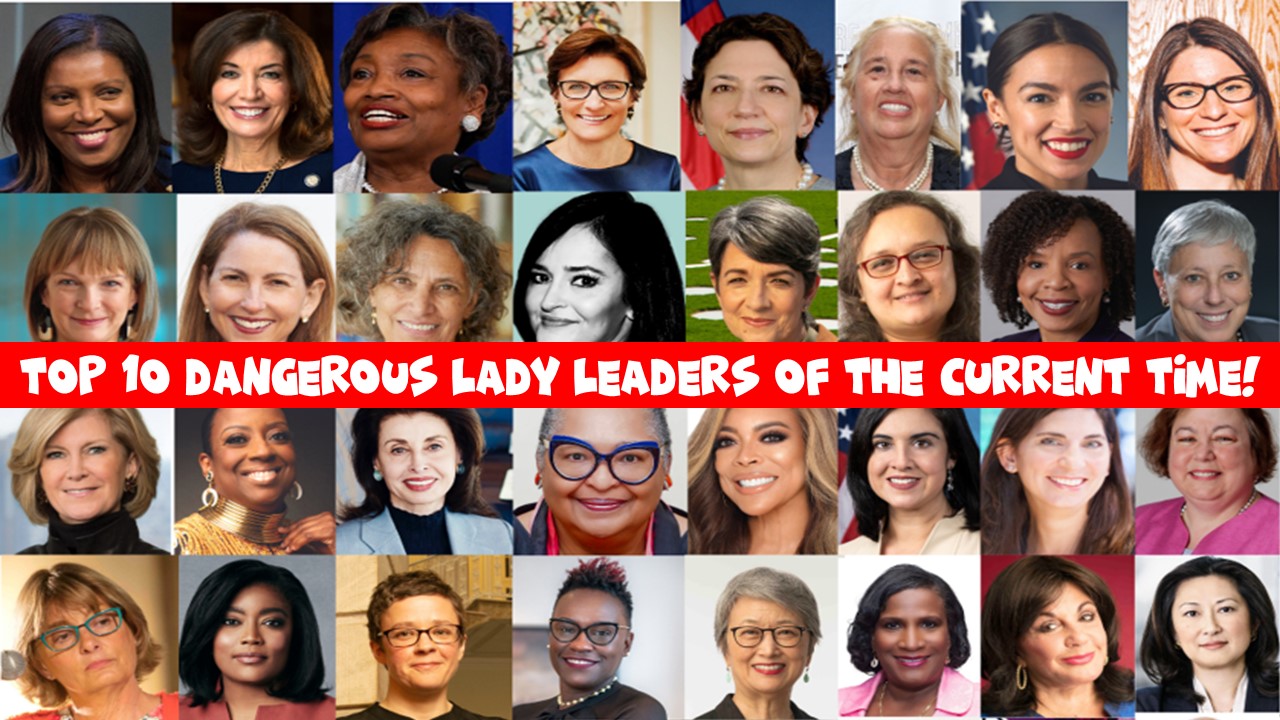Delve into a compilation of the ‘Top 10 Dangerous Lady Leaders of the current era, examining their controversial actions and the global implications of their leadership choices.
It’s important to note that terms like “dangerous” can be subjective and context-dependent. Branding a leader as “dangerous” can be seen as an opinion rather than a fact. However, I can provide you a list of female leaders who have been perceived as controversial or who have made assertive decisions that have drawn international attention as of my last update in September 2023. Note that this is a non-exhaustive list and is not ranked in order.
Certainly, here’s an expanded overview of the female leaders mentioned:
1. Aung San Suu Kyi (Myanmar)
- Background: Aung San Suu Kyi was once globally celebrated for her peaceful resistance to Myanmar’s military junta and was awarded the Nobel Peace Prize in 1991.
- Controversy: Her reputation started to tarnish due to her perceived inaction and silence on the alleged ethnic cleansing of Rohingya Muslims in Myanmar’s Rakhine state. International entities expressed deep concerns over human rights violations, and some even called for her Nobel Prize to be revoked.
2. Carrie Lam (Hong Kong)
- Background: Carrie Lam has held several senior positions in the Hong Kong government before becoming its Chief Executive.
- Controversy: Under her leadership, the proposed extradition bill led to widespread protests in Hong Kong in 2019. Critics argue she undermined the “one country, two systems” principle, bringing Hong Kong closer under Beijing’s direct control.
Must Read: Top 10 Super Power Leaders of the World Today
3. Sheikh Hasina (Bangladesh)
- Background: Serving as Bangladesh’s Prime Minister for several terms, Hasina is one of the longest-serving leaders in South Asia.
- Controversy: Accusations of voter suppression, crackdown on free press, and limiting opposition rights have marred her tenure, though under her leadership, Bangladesh has also seen remarkable economic growth.
4. Isabel Díaz Ayuso (Spain, Madrid’s region)
- Background: Ayuso, a member of the conservative People’s Party, became President of the Community of Madrid in 2019.
- Controversy: Her management of the COVID-19 pandemic, particularly her reluctance to impose strict lockdowns, drew criticism. She, however, defended her approach as balancing health and economic concerns.
5. Lea Salame (Lebanon)
- Background: A prominent media figure, Salame has conducted numerous interviews with high-profile figures and has hosted several talk shows.
- Influence: Her significant media presence means she plays a pivotal role in shaping public discourse in Lebanon, sometimes leading to contention due to the nation’s complex political landscape.
6. Priti Patel (UK)
- Background: As the UK’s Home Secretary, Patel plays a pivotal role in the nation’s domestic policy.
- Controversy: Patel’s hard-line stances on immigration and law enforcement have drawn both support and criticism. Allegations of bullying staff members also raised concerns about her leadership style.
7. Jeanine Áñez (Bolivia)
- Background: After President Evo Morales was pushed to resign amidst allegations of election fraud, Áñez declared herself interim president.
- Controversy: Her presidency was marked by conflicts and allegations of human rights abuses, with some sectors of Bolivian society and international observers labeling Morales’s ousting as a coup.
8. Kamala Harris (USA)
- Background: Kamala Harris made history as the first female, first Black, and first South Asian Vice President of the United States.
- Challenges: While her position is largely ceremonial, Harris’s involvement in various policies, especially regarding immigration, has received mixed reactions from both conservatives and progressives.
9. María Eugenia Vidal (Argentina)
- Background: As the former Governor of Buenos Aires Province, Vidal is a significant figure in Argentine politics.
- Controversy: Her tenure witnessed confrontations with labor unions and austerity measures that were both praised for fiscal responsibility and criticized for perceived social costs.
10. Sahle-Work Zewde (Ethiopia)
- Background: Zewde became the first female President of Ethiopia in 2018, though the role is mainly ceremonial.
- Challenges: Ethiopia faced significant internal conflicts during her tenure, notably in the Tigray region, which brought the country under intense international scrutiny.
It’s vital to reiterate that every leader’s tenure is multifaceted. While they face criticisms, they also achieve successes and positive changes. The perception of their leadership often varies based on political, social, and regional biases.
Remember, while these leaders have faced criticism and controversy, they also have their supporters and achievements. Leadership, especially in challenging times or environments, often results in mixed legacies and perceptions.You may oppose on this list of Top 10 Dangerous Lady Leaders of the curremt era.

